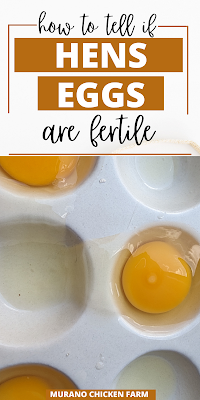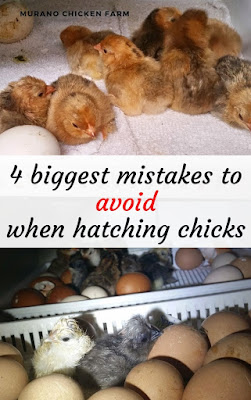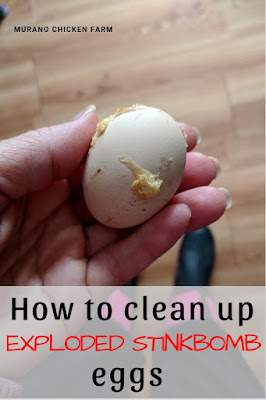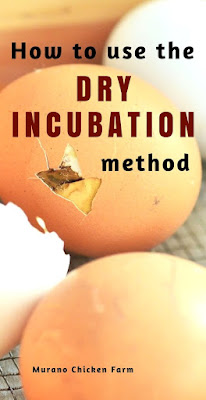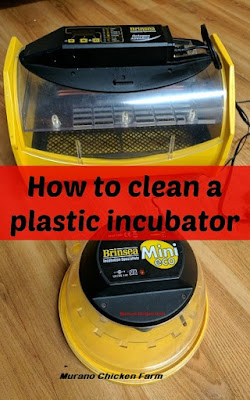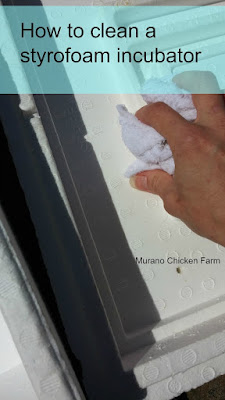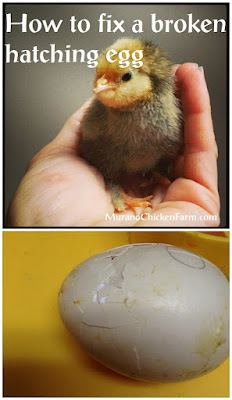How to hatch duck eggs
The first time I incubated duck eggs I just popped the eggs in my incubator along with the chicken eggs and used all the same settings as I do for chicks. It worked and he hatched, but I would quickly find out that I needed to change a few things to have every hatch go perfectly.
Other than the longer incubation period, duck eggs and chicken eggs are quite similar in incubation procedure. With a few tweaks though, I started to get a better hatch rate and I was hooked on hatching my own ducklings.
Of course the easiest method is always to have a hen hatch the eggs if you have a broody hen. Either a chicken hen or duck hen will work, they both can hatch duck eggs just fine. It gets a little funny when the baby ducks try to swim in the water container though as chickens don't understand that behavior!
If you don't have a broody hen though, you'll have to chose and use an incubator.
How to tell if hens eggs are fertilized
Hens do not need a rooster to lay eggs. In fact, almost every egg on the grocery store shelves was laid by a hen that did not have access to a rooster! It just doesn't make financial sense for commercial egg laying flocks to have a rooster since the hens are usually all caged.
However, many homestead flocks, breeding flocks or commercial flocks that sell fertile eggs have roosters! And of course the roosters job is both to protect the flock of hens and to fertilize said eggs.
Well, he actually fertilizes the hen and she stores the sperm in storage tubules until she needs it. One egg is produced by a hen per day, so she basically uses the sperm throughout the next few weeks.
When a rooster mates a hen, she can produce fertile eggs for up to 3 weeks later. So if you have a rooster with your hens, how do you know if her eggs are fertile or not? Well unfortunately no matter what anybody says online... and I've read some doozies... you cannot tell if an egg is fertile unless you crack it open, or attempt to incubate it.How to choose a poultry incubator
I have been hatching my own eggs for about 12 years now and during that time I have used several different types of incubators in all different price levels. When you begin hatching eggs, choosing your incubator is very important.
Most people decide purely based on price but I believe you should chose the style you prefer and then find one in your price range.
The cheapest incubator you can buy (that actually works well) is about $45 and it's a still air Styrofoam model that holds around 40 eggs.
The most expensive incubator you can buy is a fully automatic cabinet model that costs around $2,500 and holds a little under 600 eggs!
As you can see, there is a lot of room between these 2 styles and that's what we are going to discuss today. Lets talk about everything incubators: still air, forced air, hygrometers, thermometers, turners and hand turning.
Related reading: Learn about incubation & hatching, terms and definitions.
Does egg shape indicate chick sex?
First of all this didn't make sense at all to me because over the years I've always incubated oval shaped eggs. In the post How to store and handle hatching eggs I talked about how odd shaped eggs should not be hatched and that they don't get as good a hatch rate as your regular, well...egg shaped eggs. Except for a few experiments with pullet eggs, I always set oval shaped eggs.
If the round egg myth was correct, I would have hatched an excess of cockerels on every hatch. That's not what happened.
How to hatch guinea keets
Thankfully it's easy to incubate guinea eggs so I hatched myself more, and have been hatching them every year since.
The first time I incubated Guinea fowl eggs I just popped the eggs in my incubator along with chicken eggs and used all the same settings as I do for chicks. It sorta worked, actually.
Other than the longer incubation period, guinea hen eggs and chicken eggs are quite similar in incubation procedure. With a few tweaks though, I started to get a better hatch rate and I was hooked on hatching my own guinea keets.
Of course the easiest method is always to have a hen hatch the eggs out. If you have a broody hen that is. Even though many guinea hens are excellent at hatching their own eggs, they aren't the best mothers at all.
I'm pretty sure they lose more keets than they manage to raise! My solution is to give the guinea eggs to a chicken to hatch and raise.
If you don't have a broody hen though, you'll have to chose and use an incubator.
4 biggest incubation mistakes
I've been hatching my own chickens since 2009. I started by making my own incubator, which is easier than it sounds. Within a few months I needed more space so I moved up to 2 Styrofoam incubators with and without turners.
I hatched chicks, ducks, quail and guineas using those for a few years before moving on to small Brinsea incubators. Another year with those and I moved on to 1 then 2 cabinet incubators and I've learned quite a bit in all those years of hatching! Here are the 4 biggest mistakes I've made.
These are no ordinary mistakes though. These are the ones that end badly every single time. The definite worst of the worst....
How to clean up a rotten egg (after it exploded!)
You can blame that horrible rotten egg smell on sulfur. Or more specifically, the proteins that make up the egg.
From The Daily Meal: Eggs are very high in two proteins, globulin and keratin. When globulin begins to decay, a toxic chemical is released that’s called hydrogen sulfide, which has that very potent sulfur smell. Keratin also has very high levels of an amino acid called cysteine, which is full of sulfur atoms.
Add that to a partially formed chick decomposing inside the egg, and you're in for a world of stench!
Once the rotten egg goo escapes the egg it can be hard to clean up. Especially if it's on your skin, hair, clothes or incubator...not to mention all over your kitchen! Yuck! Unfortunately I've cleaned up a lot of eggs over the years and I've learned that it's not that difficult to clean up rotten egg. It just depends what the mess is on.
Don't worry...we'll get it cleaned up!
Dry incubation: Raise your hatch rate by not adding water
I know this is completely against all the incubation instructions you've read up until now, but many people who had low hatch rates switched to this method and swear their hatch rate skyrocketed.
That is exactly why I first tried this incubation method years ago and I still use it all the time, although I do sometimes hatch chicks the regular way as a comparison.
The traditional incubation method calls for the humidity inside the incubator to be 40-50% during the first 18 days. With dry incubation you're going to allow the humidity level to get as low as 15% before you add any water. With both methods you're going to raise the humidity to around 60-65% during the lockdown period.
Related reading: Which incubator should you use?How to incubate eggs and hatch chicks
Since hatching season is rapidly approaching, I think now is the time to talk about incubating eggs and hatching chicks. First, decide if you should hatch chicks instead of buying them already hatched. Most people choose to incubate eggs that they purchased from a breeder to add a new breed to their flock.
You can buy hatching eggs from a flock clear across the country and have them shipped to you. That's how I get most of my chickens, especially the fancy breeds. Others just like to expand their flock by hatching eggs from their own chickens.
Obviously the easiest way to hatch chicks would be to just let a broody handle the egg hatching. That way you don't have to worry about temperature, humidity and all that jazz. This is easiest if you want to hatch chicks from your own flock. If you don't have a broody though you'll need to use an incubator and that's where it gets a little more complicated.
Related reading: Which incubator should you buy?
How to clean a plastic incubator
A dirty egg incubator is a breeding ground for bacteria which can cause your hatches to fail. None of us want that to happen! So technically the best thing to do is to clean your incubator after every hatch. I know it's hard to put off chicks, but for the sake of your next set of eggs you have to do it. We'll try to get this cleaning thing done as quickly as possible!
How to clean a styrofoam incubator
Ideally we should be sterilizing our incubators between every hatch to get rid of bacteria and egg residue. How many of us actually do this? (hides under chair)
So the question is do you know how to clean your incubator? There are many different types of incubators: Styrofoam, hard plastic and cabinet incubators are the most common. Today I want to talk about cleaning your Styrofoam incubator. If you happen to have a plastic incubator, don't worry...I gotcha covered too! Go here: How to Clean a Plastic Incubator. Ok, back to my Styrofoam incubator cleaning procedure.
Incubation and hatching terms and definitions
Well, I've wracked my brain for every incubation term I could think of and compiled a list of terminology for you. Hope this helps you on your chick hatching adventure!
Dictionary of hatching and incubation terms
- Air cell: The pocket of air inside the egg at the large end. The air cell gets larger as incubation progresses.
- Albumen: The egg white.
- Blastoderm: This is the nucleus of the egg when it is fertilized. Seen on the yolk.
- Blastodisc: This is the nucleus of the egg when it is unfertilized. Seen on the yolk.
- Blood Ring: A line or ring of blood inside an egg that has started to develop into a chick but quit at an early stage.
- Bloom: The protective coating on freshly laid eggs that helps seal the pores of the egg shell. This prevents bacteria from entering the egg. Also called the cuticle.
How to save a cracked hatching egg
So you can imagine my heartbreak when the lid of the incubator slipped out of my hand and crashed down on this precious egg. The egg was cracked in several places. I almost cried. Almost, but I know a cracked egg can still hatch once it's mended properly, so I just sprung into action. Meet Lucky: he came out of that broken egg & this is how I saved him.
10 Chicken Supplies from the Dollar Store
I buy lots of chicken supplies at the dollar store (I prefer Dollar Tree) Many are the same exact item and others need thrown out and replaced so often that I feel like I'm just throwing money away!
Here are 10 things I always buy at the dollar store and why. Keep in mind that even though many dollar stores are raising their prices now in 2025, it's often still cheaper to shop there for many of these items than grocery stores, Walmart, Target, Amazon etc.
I've added comparison prices and links if you want to order them online. Since many dollar stores have changed prices but many are still just one dollar, I highly suggest you take a visit to the local dollar store before ordering to compare prices.
Can refrigerated eggs hatch?
It's not supposed to work that way! Fertile hatching eggs are supposed to be stored at room temperature and put in the incubator in under 10 days. In fact there is a very specific set of rules for handling hatching eggs that should be followed. That is not what had happened here!
Hatching refrigerated eggs
Here is how she came to be......
It was one morning about 2 years ago when I made my husband breakfast, scrambled eggs of course. A few bites into it he looks at me and says "these eggs taste funny". Ever have that moment when you realize you did something drastically wrong? That was this moment! My stomach drops to the floor and all the sudden the thought slams through my mind "oh crap I should have thrown those eggs away!"
How to store and handle hatching eggs to get the best hatch rate
Over the years I have tried everything! I've tested every hatching 'rule' and myth. It just so happens I keep excellent records, so I went back through my hatching logs and collected all the data on which myths were just that, and which ones were actually true!
The format for this post is simple. First I'll name the hatching 'rule'. I'll list why that's the recommended procedure and then I'll discuss why some people don't believe it. I'll then give you my results from testing the myth. Finally, I'll give you the answer as to whether that hatching rule needs followed or not.


